|
|
|
Sort Order |
|
|
|
Items / Page
|
|
|
|
|
|
|
| Srl | Item |
| 1 |
ID:
122424
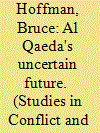

|
|
|
|
|
| Publication |
2013.
|
| Summary/Abstract |
This article considers the current state of the Al Qaeda terrorist movement and its likely future trajectory. It considers the principle assumptions both today and in the past about Al Qaeda and how they affect our understanding of the movement and the threat that it poses; Al Qaeda's current capacity for violence; and its ability to plan strategically and implement terrorist operations. The article further identifies nine key change drivers that will likely determine Al Qaeda's fate in the years to come before concluding that, even while the core Al Qaeda group may be in decline, Al Qaeda-ism, the movement's ideology, continues to resonate and attract new adherents. In sum, it argues that Al Qaeda remains an appealing brand most recently and most especially to extremist groups in North and West Africa and the Levant.
|
|
|
|
|
|
|
|
|
|
|
|
|
|
|
|
| 2 |
ID:
130544
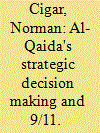

|
|
|
|
|
| Publication |
2014.
|
| Summary/Abstract |
As the united states draws down its military presence in Afghanistan, it is appropriate to revisit how the war was ignited and , in particular, Al-Qaida's role in that process. An understanding of Al-Qaida's thinking in preparing and executing this operations provides helpful insight into its decision making system and into its planning process in relation to both overall policy and, specifically, to its decision to launch the 9/11 operation in 2001.
|
|
|
|
|
|
|
|
|
|
|
|
|
|
|
|
| 3 |
ID:
134004
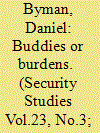

|
|
|
|
|
| Publication |
2014.
|
| Summary/Abstract |
Drawing on organization theory, this article argues that al Qaeda seeks affiliates to expand the scope and scale of its operations, gain the benefits of greater local expertise, better spread innovations, and?most important?endow itself and its mission with greater legitimacy. The conventional wisdom on al Qaeda affiliates emphasizes these benefits and thus paints affiliation as a tremendous boon to al Qaeda that magnifies the danger of terrorism. However, al Qaeda faces a host of problems related to delegation and integration, and often affiliation is a net loss. Divergent preferences and priorities, branding problems, shirking at the local level, adverse selection, and costly control mechanisms all make affiliates of questionable value to the core organization. Although the danger al Qaeda poses may have morphed with the core declining and the affiliates rising in importance, the broader movement is probably less dangerous than it was when the al Qaeda core was at its height. US counterterrorism often magnifies these integration problems and, if done well, can further induce friction, discredit the brand, and otherwise throw sand in the gears. The broader study of al Qaeda and its affiliates also offers insight into the study of organizations in general.
|
|
|
|
|
|
|
|
|
|
|
|
|
|
|
|
| 4 |
ID:
133508


|
|
|
|
|
| Publication |
2014.
|
| Summary/Abstract |
The study examines the effect of female suicide attacks on foreign media framing of conflicts. Examining the Palestinian-Israeli conflict, 2,731 articles were sampled that covered terrorist events (American, British, and Indian press); 625 appeared in the week following a female's suicide attack, 97 reported an attack by a female perpetrator. The findings suggest that foreign media discourse around female suicide bombers promotes more messages about the society within which the terrorists are embedded. Since the coverage of female terrorists tends to provide more detailed information about the perpetrator, it focuses more on the terror organizations' side of the conflict's story.
|
|
|
|
|
|
|
|
|
|
|
|
|
|
|
|
| 5 |
ID:
126770
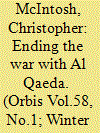

|
|
|
|
|
| Publication |
2013.
|
| Summary/Abstract |
As long as we conceive of the fight with al qaeda as a war, the fight will remain unwinnable and the goal of effective destruction will remain beyond our reach, according to the author. Historically speaking, modern wars require negotiated conclusions or the complete eradication of present and future threats. The former is politically impossible and the latter is historically unachievable.
|
|
|
|
|
|
|
|
|
|
|
|
|
|
|
|
| 6 |
ID:
133048


|
|
|
|
|
| Publication |
2014.
|
| Summary/Abstract |
Post 9/1 t, homeland security got tast tracked in the US and it is generally believed that the mainland has not suffered any terrorist incident since then aside from the Boston bombings at 2013 and periodic 'lone wolt' attacks. Most countries have come to realise that homeland security has a much wider canvas than protection lrom acts of violence. Within India, the tabric at homeland security apparently comprises a host of dots that are yet to be fully connected; integration of the security sector, intelligence, surveillance, national net-centricity et al. Homeland security involves pro-active policies and implementation in terms at analysis, reorganisation, diplomacy, intelligence gathering, building and synergising the security sector, or whatever it
takes to proactively detend the homeland. It goes for beyond civil detence.
|
|
|
|
|
|
|
|
|
|
|
|
|
|
|
|
| 7 |
ID:
132267
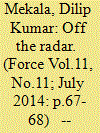

|
|
|
|
|
| Publication |
2014.
|
| Summary/Abstract |
The government should speed up its project of integrating India's coastline into one radar network The horrific terror attack on Mumbai on 26 November 2008 exposed the vulnerability of the Indian continent via the sea route. Immediately after, the ministry of home affairs (MHA) planned to integrate the entire coastline into one radar network which can seamlessly monitor movements in the sea. The government entrusted Bharat Electronics Limited (BEL) with the responsibility of establishing a chain of 46 static radar sensors along the coastline in Phase-I of the project. Out of these, 36 were planned to be implemented on the mainland while the remaining 10 were to be set up on the islands. As of August 2013, BEL's project was able to activate only 34 radar stations on the mainland.
|
|
|
|
|
|
|
|
|
|
|
|
|
|
|
|
| 8 |
ID:
124538
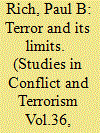

|
|
|
|
|
| Publication |
2013.
|
| Summary/Abstract |
This article argues that much of the historical analysis of terror and terrorism in history has been weak in understanding the limits on terrorist activity and how terrorist campaigns eventually end. Reviewing three recent studies that examine various aspects of terrorism and the language of terror, the article seeks to show that states often play a major role in the way terrorist movements develop and eventually end up either defeated or moving into mainstream political engagement. The article points to a number of examples to illuminate this including the Carbonara in nineteenth century Italy, the Paris Commune and the ending segregation in the U.S. South in the 1960s.
|
|
|
|
|
|
|
|
|
|
|
|
|
|
|
|
|
|
|
|
|